As a property manager, you have hundreds of tasks on your plate and a myriad of problems on your mind.
At DRYCO, we know you are busy and looking for qualified help to keep your property safe, clean, and running smoothly.
When it comes to exterior property maintenance, we are here to help make your job a little easier by providing the best practices and work available.
In this blog, we go over four services that any property manager can outsource. And when you work with a trusted partner like DRYCO, you can have peace of mind knowing your property is in good hands.
Let’s get started!
Table of Contents

1. Hiring a Paving Contractor

2. Protecting Your New Asphalt

3. Protecting Your Asphalt Long Term
Hiring A Commercial Paving Contractor
Obviously, the first step towards getting your asphalt paving job accomplished is hiring a paving contractor.
This step is pivotal to the overall success of your project. How smoothly your project goes and how much stress it will cost you largely hinge on hiring a good (or bad) contractor.
What are the results of hiring a bad contractor?
Poor communication, being confused throughout the process, making uninformed decisions, and in the worst-case scenario, losing money.
On the other hand, hiring a good contractor means good communication, education throughout the process, informed decisions, and your money’s worth out of the job.
Making a good decision is important!
What is involved in making sure you hire the right paving contractor?
Here are some tips:

Choose local
Choosing a local contractor automatically narrows down your search, but that is only one good reason to choose local.
A local contractor is likely familiar with weather and soil conditions that might affect your paving job. They should also be familiar with local regulations and codes that might apply.
Therefore, choosing a local contractor (or a contractor that has experience working in your area) puts you ahead and ensures compliance with local laws.
Hiring a local asphalt contractor also means that the money you pay for the service stays within your community. Plus, hiring locally means you have a better chance of being able to check references and to get a feel for the reputation of the contractor.
Look for certifications
The asphalt contractor you choose should be certified by a reputable professional organization and fully insured. When a contractor is certified it means they have met or exceeded standards for acceptable work in their industry.
Which, needless to say, is something you want!
Insurance is also crucial as it protects you and your contractor if something should go wrong during the job.
Contact contractors by phone
Once you have a list of potential contractors, contact them by phone.
Why do we recommend phone communication?
Talking to them on the phone gives you an idea of how communicative they are. If you have trouble reaching them or they never return messages, remove them from your list. Be prepared to ask them questions and gauge how willing they are to answer you and engage in dialogue.
It’s best if the contractor is quite communicative and willing to educate you in their process, and talking to them over the phone is one of the best ways to determine this.
However, make sure your final agreement with a contractor doesn’t come over the phone or via an informal handshake. Lots of problems between contractors and homeowners or property owners comes via miscommunication, so we highly encourage you to finalize a deal with a contract in writing.
Then, you can refer back to the contract anytime the scope of work or the timeline is in doubt.

Ask for references
Before you commit to a paving contractor, ask for some references, particularly of commercial jobs similar in size and scope to your project. This is one of the most critical pieces of hiring a trustworthy contractor.
If the contractor refuses to provide references, eliminate them from your list immediately.
If the contractor provides a lot of references, you don’t have to contact all of them. But it’s good to give a few of them a call and ask specific questions about their satisfaction with the contractor and their work.
Another option is to look at a contractor’s online reviews. Just keep in mind that people are more likely to leave online reviews if they have a negative experience, so if you want an unbiased perspective, giving a reference a call is a good idea.
Ask for estimates
Ask several of the contractors on your list for estimates before you make a final commitment. Be suspicious of estimates that are significantly lower than all the others. These contractors may cut their costs by cutting corners, which could affect quality in the long run.
Don’t take shortcuts when choosing a contractor! By choosing a reputable, trustworthy contractor, you set yourself up for a good experience and a quality job.
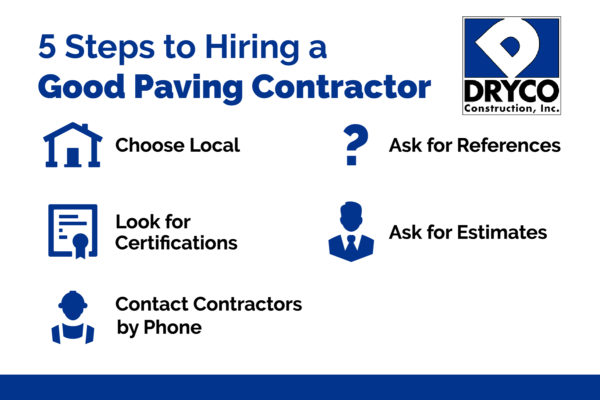
Protecting Your New Asphalt
If you hire a great contractor, installation should go well for you.
But what should you watch for after the fresh asphalt is laid?
Here are some tips to help you properly protect and care for your new asphalt to help prevent damage while it cures.
Don’t drive on fresh asphalt
Your contractor can give you specifics on when you can use your new driveway, parking lot, etc. But in general, you should allow your new asphalt to harden for at least 2-3 days before using it.
This is particularly critical with truck traffic and heavy machinery that is often used around commercial warehouses and properties.
You can walk on new asphalt immediately, but you should keep vehicle traffic off for at least 2-3 days. If you live in a hot area your contractor may suggest waiting longer, as asphalt softens in heat.
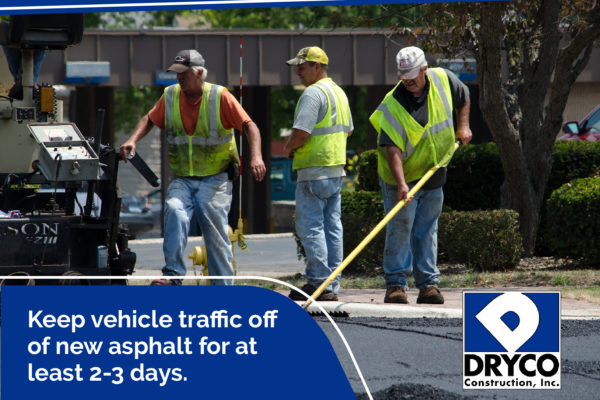
Protect the asphalt while it’s curing
After 2-3 days, you can use your asphalt driveway or lot.
But that doesn’t mean it’s finished – it still has to cure.
New asphalt contains an excess amount of oil. When the sun’s rays hit the asphalt, they trigger a process called oxidation, in which the extra oil is lost. When all the excess oil is gone, the asphalt is “cured” or fully hardened. As it cures, it lightens from black to gray and becomes tougher.
During the first month of curing, the asphalt is still weak and pliable. It needs extra protection during this time. After a month, you can start using it normally, but keep in mind that it takes up to a year for asphalt to fully cure.
In the following few points, we will detail how to protect your asphalt during that first month.
Avoid excessive weight
While the asphalt is new (and therefore still uncured and pliable), it’s best not to drive excessively heavy vehicles on it. Big vehicles like dump trucks or trailers can cause depressions in the weak asphalt, so keep them off for at least a month.
It’s especially important not to park big vehicles in one spot for extended amounts of time. If you have to park a large vehicle on your new asphalt, put plywood under the wheels to distribute the weight and prevent depressions.
Vary your parking spots
Always parking in one spot while your asphalt is still soft may result in marks or depressions where the wheels sit, even if the vehicle is small. To prevent this, park in a different place each time.
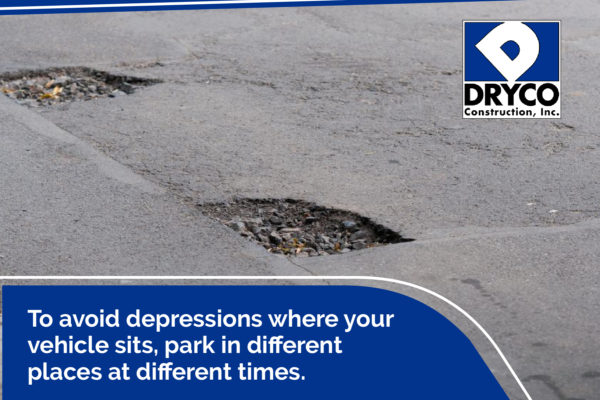
Also, don’t turn your steering wheel back and forth while your car is sitting still on new asphalt, and don’t take off too fast. Wheel movements like these can scar fresh asphalt.
Simple measures like these help protect your asphalt so you can enjoy it long into the future!
If you really want to take things to the next level, make sure your lot is equipped with excellent parking lot striping and marks. You can read more about this in our blog: Parking Lot Striping: All You Need To Know.
Pay attention to the edges of the asphalt
The edges of a driveway or commercial lot are the weakest areas. They are not well supported and may crack or crumble under too much strain. Avoid driving close to or over the edges of your newly paved areas.
To help protect the vulnerable edges, you can build topsoil or other landscaping materials up to the edges of your asphalt. This helps support the edges and keep them from cracking.
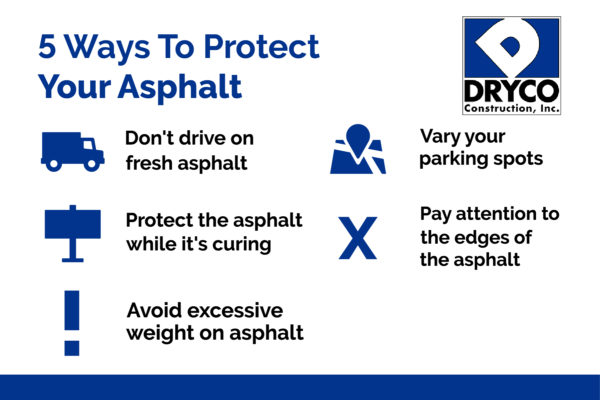
Protecting Your Asphalt Long Term
You need to take special care of your asphalt when it is new, but it doesn’t stop there. You need to take good care of it long-term as well, so that you can get the most out of your asphalt paving job.
How long asphalt lasts depends on various environmental factors. But if you care for your asphalt correctly, it can last 20 years or more!
Want to know how you can properly care for your asphalt driveway or lot?
Here are some quick tips:
Fix asphalt fractures immediately
Asphalt pavement may crack for a variety of reasons. It may crack because of water damage, shrinking due to weather cycles, poor construction, or other reasons.
Whatever the reason, you should deal with any fractures immediately so they don’t get bigger and cause potholes, breakage, or more damage.
If you see a crack forming, you can fix it yourself with an asphalt patch product – it’s simple to do.
Here’s how:
- Buy an asphalt patch product
- Clean the fracture and let it dry
- Fill the fracture with the asphalt patch product
- Smooth out the patch and let it dry
If you see a fracture forming, don’t wait for it to get larger! Take care of it right away, so that it doesn’t cause more problems.
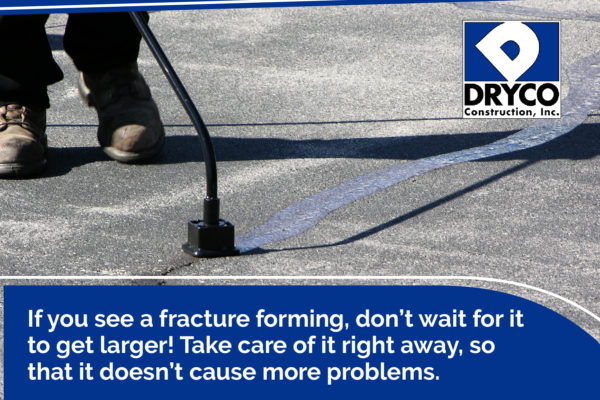
A good way to prevent fractures from forming in the first place is to get your asphalt seal coated regularly. We will explain what seal coating is later in this article.
Remove weeds from asphalt
We all know weeds will grow in the most unlikely places, including on your asphalt driveway!
Weeds can spring up from unfilled fissures in the asphalt or encroach on the edges of your lot. They might even push up through thinning asphalt.
Unfortunately, these weeds can have negative consequences on your asphalt. The weeds can make small fissures larger or eat away at the disintegrating edges of your asphalt. Weed roots are horrible for asphalt, pushing through the material and causing it to break apart.
When you see a weed in your asphalt, pull it immediately. Use weedkiller afterward to make sure the weed roots are dead. If you don’t kill the roots, the weed will just grow again.
Deal with water properly
Water is one of the biggest threats to your asphalt, especially if freezing is possible.
You may not believe this, or think that something like a little standing water couldn’t possibly hurt something as tough as asphalt – think again!
When water freezes it expands, sometimes breaking whatever surrounds it. In fact, ice can burst even the heaviest metal pipes if it freezes inside.
If even a little water stands on asphalt or gets down into the cracks, it can get cold and expand, weakening the asphalt and causing it to crack and break. The more it cracks and breaks, the more water gets into it.
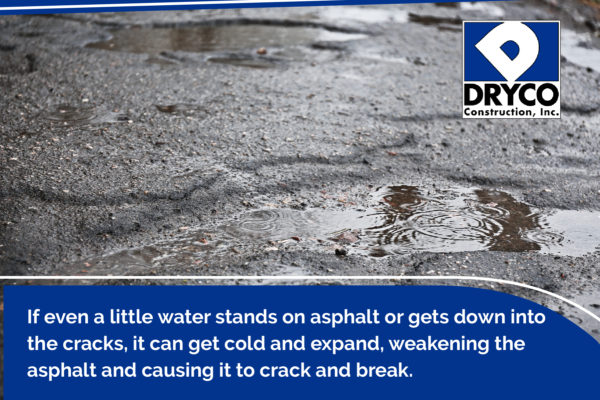
You can see that it’s a vicious cycle.
It’s best to work out a good drainage system at day one, as it’s much harder to go back and fix a water problem later. Your contractor should take it upon themselves to work out a drainage solution for your project.
However, if your driveway does end up with puddles, it is possible to go back and fix the problem later with patching. An expert can also help you fix the problem.
Other things you can do to prevent water damage on your asphalt include:
- Fill any splits and fractures immediately
- Repair potholes
- Invest in sealcoating
More on seal coating coming up next!
Invest in sealcoating
Over time, asphalt gets brittle and weak. Sealcoating is a sealer (made of oils, tar, and other materials) you can apply in a thin layer over your asphalt to help protect it. Essentially, it provides another layer of protection between your asphalt and the elements.
Sealcoating does several things for your asphalt:
- Slows down oxidation – Oxidation removes oils from your asphalt. Fresh, soft asphalt has too much oil, so at first, oxidation is good and makes the asphalt stronger. After a while, there isn’t much oil left in your asphalt. It can then get brittle and dry. Sealcoating protects your asphalt from oxidation so this doesn’t happen.
- Prevents water from entering cracks – As we discussed earlier, water is harmful to your pavement. Sealcoating seals in the cracks so water can’t get in.
- Protects asphalt from fuel spills – Fuel spills can also be detrimental to asphalt. A seal coat provides one more layer of protection!
- Improves aesthetics – As it ages, asphalt turns from crisp black to faded gray. Sealcoating restores the fresh, black look of new asphalt!
Be smart and invest in regular sealcoating! It’s one of the best ways to extend the life of your asphalt pavement. However, you don’t want to sealcoat fresh asphalt, as that could damage it.
It’s best to sealcoat your asphalt driveway roughly once every three years.
Avoid spills
Liquids like gas, diesel fuel, oil, anti-freeze, and other chemical spills are harmful to asphalt. They can cause the asphalt to break down, as well as leave unsightly stains on the surface.
Avoid this type of spill, and if a spill does happen, clean it up right away.
Here is how to clean up a spill on asphalt:
- Use an oil-absorbent material to absorb the liquid. You may have to let the spill absorb overnight.
- Sweep away the absorbent material and hose down the stain.
- Scrub the spot with a cleaning detergent to remove any remaining residue.
Do Winter Maintenance
Winter weather can be brutal on asphalt. Be sure to give your lot or driveway a little love during the cold months – particularly if your business is in an area that freezes.
Here are some tips:
- Fix cracks and seal coat before bad weather hits – if water gets down in cracks and freezes, it will expand, making the gap bigger.
- Remove snow and ice promptly – keeping your asphalt free of snow and ice helps prevent damage.
- Choose a safe de-icer – Some de-icers are bad for pavement. Here’s more about de-icers and how to choose the best kind.
Proper winter maintenance will help keep your pavement in good functioning shape.
Now, if you want an in-depth look at pavement maintenance, make sure to read our blog: The Ultimate Guide to Pavement Maintenance.
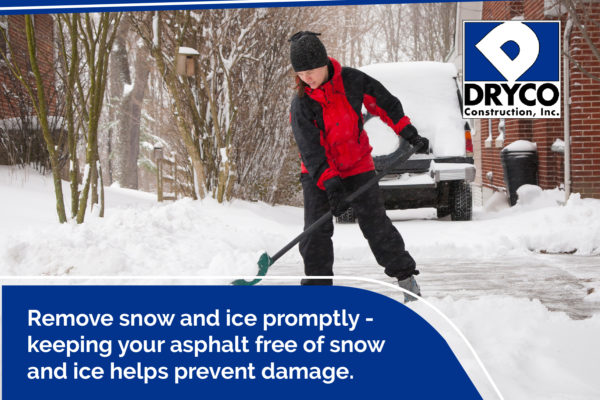
Conclusion
Although new paving may look like a big job, if you follow these tips, your asphalt paving experience should be a good one!
Are you ready to get started right now?
If your business is located in the greater Bay Area or Sacramento region, then give us a call at DRYCO!
We offer a range of services from asphalt paving to sealcoating to parking lot maintenance.
And we’ll always make it easy to work with us.
We also offer services such as decorative hardscaping, game courts, commercial fencing, and striping.
Give us a call today! We look forward to hearing from you and helping your paving or concrete experience go well.
